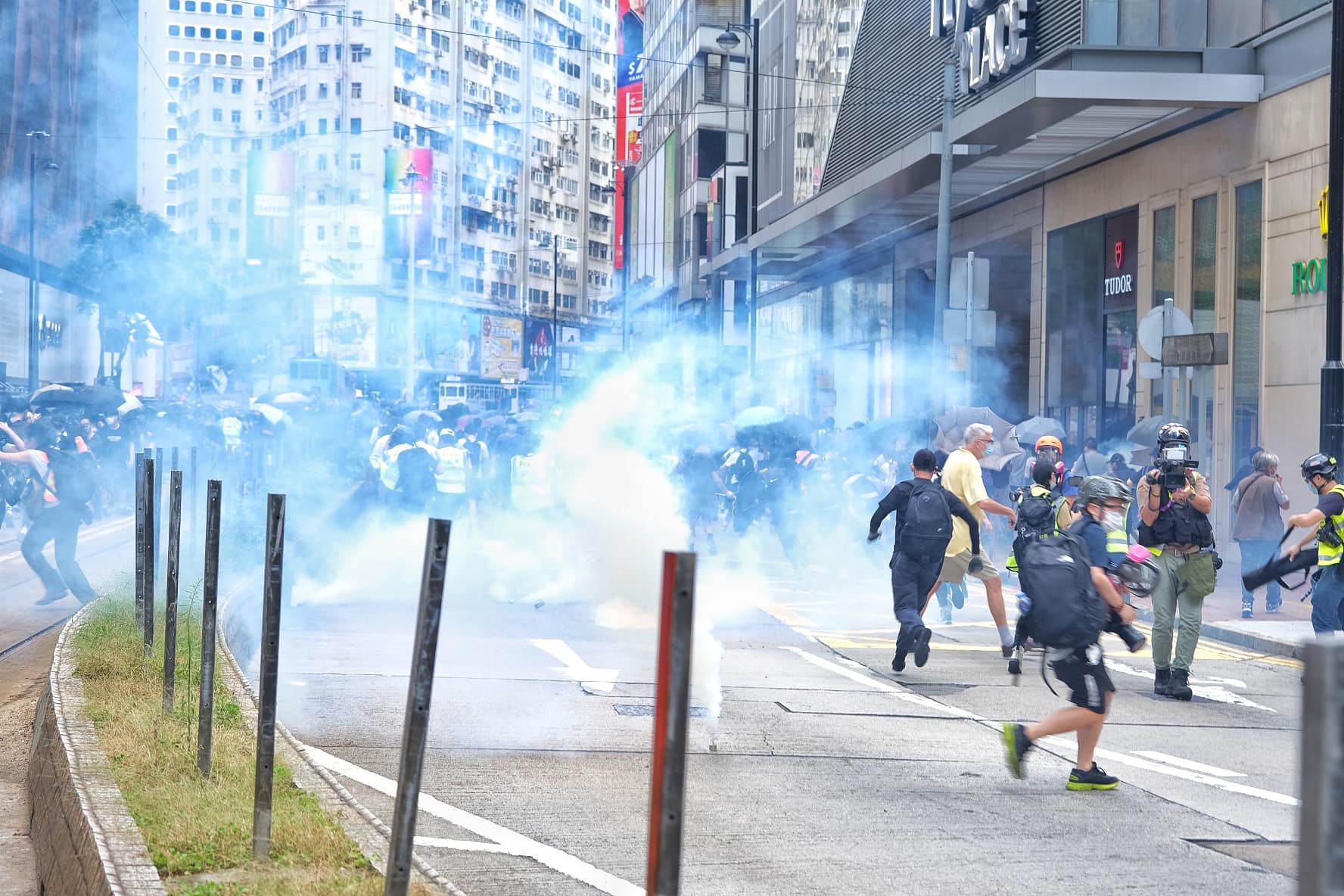A Hong Kong court has sentenced four men to up to two years and ten months in jail over wounding a lawyer at a protest against the national security law in May 2020.

Handing down the sentences at District Court on Friday, Deputy District Judge Daniel Tang said the four defendants, Tong Kin-pong, Yue Wai-lun, Cheng Hok-ming and Owen Wong, had been affected by the “atmosphere in society” and had expressed remorse for their actions.
The four were convicted last month of wounding solicitor Chan Tze-chin with intent, rioting and unlawful assembly on May 24, 2020. That day, several thousand Hongkongers blocked traffic and damaged shopfronts in Causeway Bay following Beijing’s announcement that it would enact the security legislation in the city.
After Chan – who was passing by – said the police ought to arrest the protesters, a group of 20 or so demonstrators assaulted him, hitting with umbrellas and kicking him to the ground.
The four were initially prosecuted for rioting and wounding. But Yue, Cheng and Wong reached a plea deal before the case was set to move to trial earlier this month, pleading guilty to the lesser charge of unlawful assembly and wounding with intent instead.

Truck driver Tong, on the other hand, denied his charges and was put on trial. But the 33-year-old changed his plea to guilty last month.
Addressing the court on Friday, Tang handed Tong a jail sentence of two years and ten months. Yue, 27, and Cheng, 25, were sentenced to two years and one month, and one year and seven months, respectively.
Seventeen-year-old Wong was sentenced to a training centre, an alternative to imprisonment for those aged below 21 where the period of detention ranges from six months to three years.
“[I] hope they can move on from the past, look towards the future and contribute to society,” Tang said.

After the court session ended, the four defendants waved to people seated in the public gallery as they shouted words of encouragement.
Security law protest
The May 2020 protest was one of the last street demonstrations Hong Kong saw in the wake of the anti-extradition unrest that began in the summer of 2019. According to the prosecution’s case, protesters lit multiple fires around Causeway Bay, vandalising the clothing store I.T Shop and the entrance of China Taiping Tower.
Protesters attacked Chan after he condemned the demonstrators’ acts. He eventually ran to the South China Athletic Association, where staff members called the police. Chan was hospitalised and his chin, right neck, left palm and left leg required stitches.
At the time, the Law Society of Hong Kong “strongly condemned” the assault, saying that people with opposing political views must not be “silenced” by violence.
Police fired tear gas at protesters and mobilised a water cannon, arresting around 180 people that day.
Ahead of announcing the sentences on Friday, Tang summarised the defendants’ backgrounds. Besides Yue, who received a 12-month probation order in 2015 for attacking police officers, none of them had prior criminal records. Tong and Cheng grew up in poor families and began working part-time in their teens, Tang said, while the sudden death of Wong’s father “forced him to mature quickly.”
In June 2020, Beijing inserted national security legislation directly into Hong Kong’s mini-constitution – bypassing the local legislature – following a year of pro-democracy protests and unrest. It criminalised subversion, secession, collusion with foreign forces and terrorist acts, which were broadly defined to include disruption to transport and other infrastructure. The move gave police sweeping new powers, alarming democrats, civil society groups and trade partners, as such laws have been used broadly to silence and punish dissidents in China. However, the authorities say it has restored stability and peace to the city.
Support HKFP | Policies & Ethics | Error/typo? | Contact Us | Newsletter | Transparency & Annual Report | Apps
Help safeguard press freedom & keep HKFP free for all readers by supporting our team

LATEST FROM HKFP
HKFP has an impartial stance, transparent funding, and balanced coverage guided by an Ethics Code and Corrections Policy.
Support press freedom & help us surpass 1,000 monthly Patrons: 100% independent, governed by an ethics code & not-for-profit.










